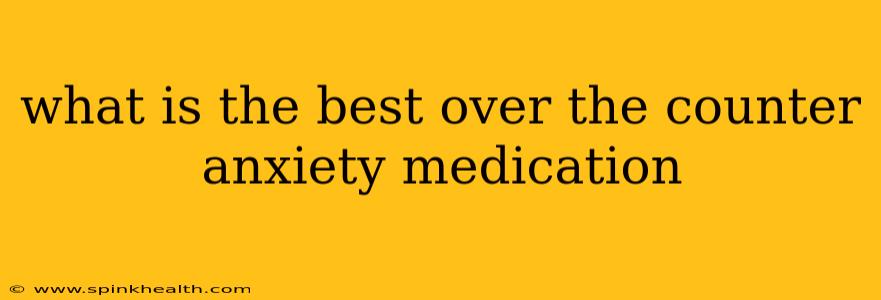Finding Relief: Exploring Over-the-Counter Options for Anxiety
Anxiety. That unsettling feeling of unease, worry, and nervousness that can creep into our lives unexpectedly. It's a common experience, and many of us seek relief without resorting to prescription medications. But what are the best over-the-counter (OTC) options for managing anxiety? The truth is, there's no single "best" medication, as what works for one person might not work for another. It's more about finding the right approach that complements your lifestyle and specific needs. Let's explore some commonly used OTC options and address some frequently asked questions.
What OTC medications help with anxiety?
This is a question many people ask, and it's important to understand the limitations of OTC medications. They don't directly "cure" anxiety, but they can offer temporary relief from some of the symptoms. The most commonly used OTC options include:
-
Diphenhydramine (Benadryl): Primarily an antihistamine, Benadryl has sedative effects that can help with some anxiety symptoms, particularly trouble sleeping caused by anxiety. However, it's not a long-term solution and can cause drowsiness.
-
Doxylamine succinate (Unisom): Similar to Benadryl, this is another antihistamine with sedative properties that may provide temporary relief from anxiety-related insomnia. Again, it's not a treatment for anxiety itself and should not be used long-term.
-
Melatonin: This hormone helps regulate sleep, and anxiety often interferes with sleep. Melatonin supplements can improve sleep quality, indirectly alleviating some anxiety symptoms. However, it's crucial to follow the recommended dosage and consult a doctor if you have any underlying health conditions.
It's important to note that these medications address symptoms of anxiety, such as sleeplessness, rather than the underlying cause.
Are there any natural remedies for anxiety?
Yes! Many people find relief from anxiety through natural methods, including:
-
Exercise: Physical activity releases endorphins, which have mood-boosting effects. Regular exercise can significantly reduce anxiety levels.
-
Mindfulness and meditation: Practicing mindfulness techniques can help you become more aware of your thoughts and feelings, allowing you to manage them more effectively.
-
Yoga: Combining physical postures, breathing techniques, and meditation, yoga is a powerful tool for stress reduction and anxiety management.
-
Herbal remedies: Some herbal remedies, such as chamomile tea or valerian root, are traditionally used to promote relaxation and sleep, but their effectiveness is not always consistently supported by scientific research and they can interact with other medications. Always consult a doctor before trying herbal remedies.
Remember, the effectiveness of natural remedies can vary significantly from person to person.
What are the risks of taking OTC anxiety medication?
While generally safe when used as directed, OTC medications can still have side effects. These can include drowsiness, dizziness, dry mouth, and constipation. It's crucial to read the label carefully and follow the dosage instructions. If you experience any adverse effects, stop taking the medication and consult a doctor. Furthermore, prolonged use of OTC sleep aids without medical supervision can be detrimental to health.
When should I see a doctor about my anxiety?
If your anxiety is severe, persistent, or interfering with your daily life, it's crucial to seek professional help. A doctor can assess your condition, rule out any underlying medical issues, and recommend appropriate treatment options, including therapy, medication, or a combination of both. Don't hesitate to reach out for support – your mental health is essential.
What is the difference between anxiety and stress?
While often used interchangeably, anxiety and stress are distinct. Stress is a response to external pressures, whereas anxiety is a more persistent feeling of worry and fear, often without a clear external trigger. Stress can trigger anxiety, but anxiety can also exist independently of stress.
This exploration provides a starting point. Remember to consult your doctor or a healthcare professional before starting any new medication or treatment, including over-the-counter options, to ensure they're safe and appropriate for your individual circumstances. Prioritizing your mental health is a crucial step towards a happier and healthier life.

